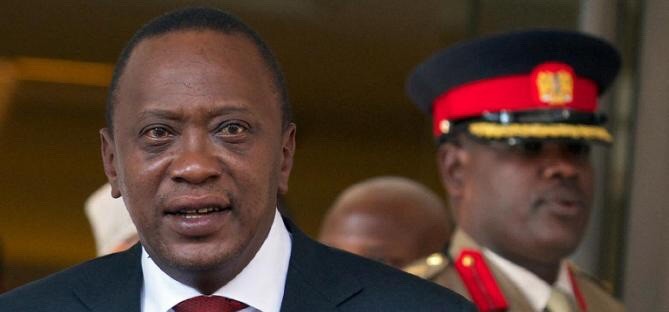Kenya’s President Uhuru Kenyatta caused a significant delay in the start of the last round of South Sudan’s peace talks, which ultimately ended in failure to reach an agreement, multiple sources told Radio Tamazuj.
The Kenyan president held an unannounced meeting with South Sudanese rebel leader Riek Machar on the day that Machar was supposed to be meeting with his rival President Salva Kiir in Addis Ababa at the invitation of the Ethiopian Prime Minister Hailemariam Desalegn.
Hailemariam, in his capacity as chairman of the regional bloc IGAD, had formally invited Machar to attend peace talks in Addis Ababa starting 27 January. The rebel leader formally accepted the invitation and agreed that he would meet Kiir in Ethiopia on that day.
But the rebel leader did not show up for the scheduled meeting with the South Sudanese president in Addis Ababa, according to South Sudan’s Minister of Information and Broadcasting Michael Makuei, who told Radio Tamazuj that Kiir was left waiting.
Instead, Machar met that day in Nairobi with both Uhuru Kenyatta and Deputy President William Ruto, delaying his arrival in Addis Ababa until the evening of 27 January.
Though Kenya’s State House diary for 27 January announced no meeting with Machar, a senior rebel official confirmed that the two top Kenyan officials met with Machar in order to warn him not to make a deal that would allow for ‘foreign’ intervention in South Sudan’s judicial system, referring to the Kenyan leaders’ experience with the International Criminal Court (ICC).
As the Kenyan leaders discussed this with Machar, the negotiations in Addis Ababa stalled. “Riek Machar has not yet come. He was supposed to arrive here at 9:00 a.m., but up to now he has failed to come… We are waiting,” government negotiator Makuei said at the time.
Another political source told Radio Tamazuj that Machar’s absence on the first day significantly affected the timetable for the talks, contributing to the failure of the round.
The two South Sudanese rivals were supposed to have had two full days to negotiate face-to-face, 27-28 January, after which the IGAD Heads of State were scheduled to meet on the morning of 29 January to either endorse the outcome of those talks or announce new measures to pressure the two sides into making a deal. In turn, the African Union Peace and Security Council meeting on the evening of the same day would endorse the IGAD resolutions.
Yet this carefully choreographed timetable was thrown off by the loss of a full day of negotiations caused by Uhuru’s meeting with Machar. To make matters worse, the talks that began belatedly the next morning were cut short unexpectedly when the South Sudanese president did not come down from his hotel suite in the afternoon, reportedly due to illness.
This meant the loss of nearly two full days of scheduled negotiations between the two principals. By the time the IGAD Heads of State showed up for their scheduled summit meeting on South Sudan on 29 January, the two parties had barely had any discussions at all.
IGAD leaders therefore never formally sat to make resolutions on a way forward with the talks, but rather proceeded to the African Union summit without deliberating on South Sudan. Unlike previous IGAD summits on South Sudan, this IGAD summit never resulted in a formal resolutions document, but rather only a late-night press conference.
‘Issues of accountability’
Kenyan officials have not explained why they arranged a meeting with Riek Machar on the same day as long-awaited peace talks were set to resume in Addis Ababa, nor what the meeting was specifically about.
Uhuru’s spokesman Manoah Esipisu confirmed that Machar and Uhuru have met several times recently but he said he did not know whether one of those meetings took place on 27 January specifically: “I don’t know specific dates but obviously during the Arusha process, during the Addis process, our president has met Mr. Machar.”
“We can’t discuss specific details of every meeting of the president,” he added, during an interview with Radio Tamazuj today.
The presidential spokesman was then asked, “You are not aware about the meeting on date 27th of January?” to which he replied, “I do not comment on specific meetings, I am saying the president has had a series of meetings with both Mr. Machar as well as Mr. Kiir.”
Nonetheless, two South Sudanese rebel officials provided more details on the discussions between Uhuru and Machar, saying that justice was one of the main issues discussed by the two men in talks prior to the Addis Ababa summit.
SPLM-IO spokesman Mabior Garang said the two politicians discussed “issues of accountability” and the “AU report,” without specifying when this conversation took place. He was referring to the report of the African Union Commission of Inquiry, which African leaders recently decided to keep confidential.
Another representative of the rebel movement, Manawa Peter Gatkuoth, confirmed that Machar met separately with both Ruto and Uhuru on 27 January specifically, the same day that the rebel leader was supposed to be negotiating peace terms with President Salva Kiir.
“In fact, Dr Riek Machar met with Kenyan top officials — first he met with the Kenyan Vice President William Ruto, who related the Kenyan experience with the International Criminal Court and called on Dr. Riek Machar for SPLM-IO to be wise and not to allow the international community to take over responsibilities in South Sudan,” he said.
“He asked Dr. Riek Machar that they should not give opportunity for foreign and international interventions in South Sudan,” Manawa said of Ruto’s conversation with Machar. The deputy president reportedly cited examples where the international community has intervened in countries and left problematic legacies in those countries.
Uhuru Kenyatta, for his part, reportedly cautioned the South Sudanese rebel leader to beware of “hidden agendas from some quarters to internationalize the issue of South Sudan, which if it happens will harm South Sudan and the whole region,” according to the SPLM-IO official.




